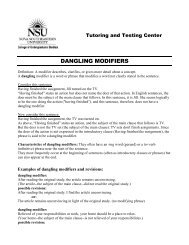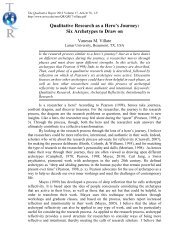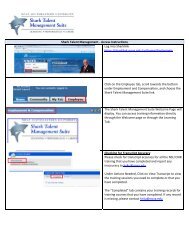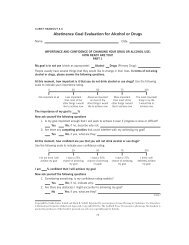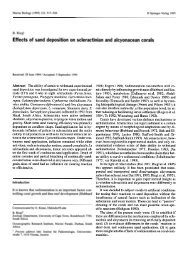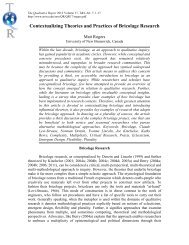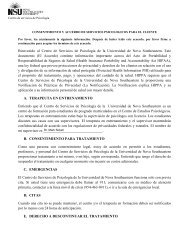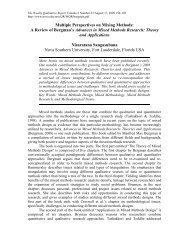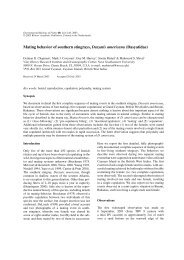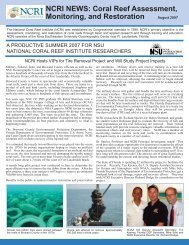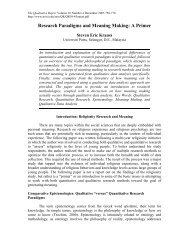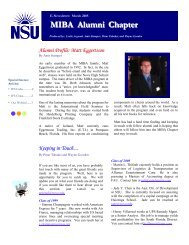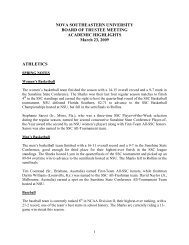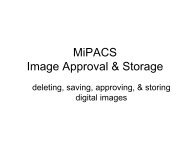11th ICRS Abstract book - Nova Southeastern University
11th ICRS Abstract book - Nova Southeastern University
11th ICRS Abstract book - Nova Southeastern University
Create successful ePaper yourself
Turn your PDF publications into a flip-book with our unique Google optimized e-Paper software.
23.988<br />
Development Of A Strategy To Guide The Use Of Remotely Sensed Information in<br />
The Management Of Coral Reef Environments<br />
Candace NEWMAN* 1<br />
1 Geography, <strong>University</strong> of Waterloo, Waterloo, ON, Canada<br />
We have developed a strategy to guide the use of remotely sensed information in the<br />
management of coral reef environments in developing countries. The strategy includes<br />
development of a habitat map using satellite imagery, investigation of stakeholder<br />
receptivity to the habitat map, use of a decision-key to determine degree of suitability of<br />
habitat types to address management questions, and context-appropriate representation of<br />
data. The strategy was developed using IKONOS 4x4 m multi-spectral satellite imagery<br />
and interview data from dive operators, fishermen, and managers of Bunaken Island,<br />
Indonesia. The potential for this strategy to address coral reef management issues is widereaching<br />
when feedback from map-users is recognized and integrated methodically.<br />
It is increasingly evident that specific, issue-focused maps are essential to address current<br />
and acute coral reef degradation concerns in developing nations. Moreover, it is<br />
increasingly recognized that dive operators, fishermen, and managers, who live beside<br />
these reefs, are well positioned to provide valuable information about the impacts on<br />
reefs and about context-relevant solutions. The challenge is to efficiently extract and then<br />
appropriately integrate this information with habitat-mapped data to develop contextspecific<br />
management maps.<br />
In this study, we develop a strategy to address this challenge. Over one year has been<br />
spent on Bunaken Island, Indonesia’s first national marine park, gathering field data to<br />
validate the IKONOS satellite image, and gathering interview data from dive operators,<br />
fishermen, and Park managers. The strategy was developed and tested with local<br />
stakeholders and considerable feedback was acquired and used to enhance the strategy.<br />
23.989<br />
Voluntary Standards as a Tool for Increasing the Sustainability of the Marine<br />
Recreation Industry and Improving MPA Effectiveness in Hawaii and Mesoamerica<br />
Rick MACPHERSON* 1 , Rich WILSON 1 , Liz FOOTE 2<br />
1 Conservation Programs, Coral Reef Alliance, San Francisco, CA, 2 Conservation<br />
Programs, Coral Reef Alliance, Wailuku, HI<br />
Standards have a long history of improving service quality and safety in a wide range of<br />
industries. Successful businesses benefit from standards both by actively participating in<br />
the standardization process and by using standards as strategic market instruments. The<br />
Coral Reef Alliance (CORAL) recently completed a process in which marine recreation<br />
industry stakeholders in Hawaii and along the Mesoamerican Barrier Reef worked in<br />
unprecedented collaborations to develop voluntary standards that will measurably<br />
improve and sustain environmental performance in scuba diving, snorkeling, boat<br />
operations, and marine life viewing. Engaging a standards committee comprised of<br />
representatives from marine recreation, conservation NGOs, tourism industry<br />
associations, marine recreation suppliers, marine park managers and government<br />
agencies, scientists, divers, local community groups, and traditional communities,<br />
CORAL is now testing the implementation of these standards and providing technical and<br />
financial support for locally based conservation initiatives. It is expected that this process<br />
will enhance adoption of standards throughout the marine recreation industry, increase<br />
industry support for marine protected areas (MPAs), and lead to the development of<br />
extensive conservation alliances which enhance MPA effectiveness and improve the<br />
economic and environmental sustainability of marine recreation in Hawaii and<br />
Mesoamerica.<br />
Poster Mini-Symposium 23: Reef Management<br />
23.990<br />
“You Tell Us We Can’t Eat The Fish But You Don’t Tell Us Why”<br />
Carlos ORMOND* 1 , David ZANDVLIET* 1<br />
1 Faculty of Education, Simon Fraser <strong>University</strong>, Burnaby, BC, Canada<br />
In our attempts to establish effective reef management programs we have tended to pay<br />
particular attention on restricting human access and intervention. While successful in some<br />
areas, they have been failures in others. We argue that in order for coral reef conservation to be<br />
truly effective we must lean more on the human dimension of coral reef ecology for support.<br />
What is needed is a much more conceded effort in integrating environmental education<br />
programs with coral reef management strategies. We are well beyond the age of discovery<br />
science that featured Darwin’s The Origin of Species. We are now in an age of environmental<br />
protection as well as the United Nations Decade of Education for Sustainable Development<br />
(2005—2014), and so our practices must evolve, as do the organisms we study, to our current<br />
environment. If in the late 20th century education has proven to be an effective vehicle for<br />
social change, how then have those of us who attempt to promote environmental change<br />
misused education?<br />
Around the world, educational programs are often classroom based with little environmental<br />
interaction. There lies a great body of research in human learning that acknowledges the<br />
positive influential affects of direct experience on learning. As well, human behavioral studies<br />
have indicated that education that occurs in local natural settings promotes environmental<br />
stewardship in an individual’s own community. With that said, outdoor educational experiences<br />
offers itself as a supplement to current reef management strategies as a way to involve the local<br />
community with the potential to create ecological knowledge, and most importantly, to provide<br />
an understanding of “why they can’t eat the fish”.<br />
23.991<br />
Hurricanes and corals in Southern Belize: from science to management and policy<br />
development<br />
M. James CRABBE* 1 , Edwin MARTINEZ 2 , Christina GARCIA 3 , Juan CHUB 4 , Leonardo<br />
CASTRO 5 , Jason GUY 6<br />
1 Faculty of Creative Arts, Technologies & Science, <strong>University</strong> of Bedfordshire, Luton, United<br />
Kingdom, 2 Belize Regional Initiative, Earthwatch Institute, Punta Gorda Town, Belize, 3 ,<br />
Toledo Association for Sustainable Tourism and Empowerment (TASTE), Punta Gorda Town,<br />
Belize, 4 Toledo Institute for Development and Environment (TIDE), Punta Gorda Town, Belize,<br />
5 Friends of Nature, Belize, Placencia, Belize, 6 Belize Department of Fisheries, Belize City,<br />
Belize<br />
There are two major coral reef areas in Southern Belize, the Sapodilla Cayes Marine Reserve<br />
(SCMR, a World Heritage Site), and the Port Honduras Marine Reserve (PHMR). We have<br />
conducted coral surveys in both reserves, determined coral growth rates, and show here that<br />
hurricanes and severe storms have limited the recruitment and survival of massive corals in the<br />
SCMR and PHMR (p=0.01), similar to our earlier findings in Jamaica. From this science base<br />
we have developed a capacity building programme for local stakeholders, in collaboration with<br />
NGOs and management authorities, to inform long-term resource management decisions in<br />
Southern Belize. This has enabled stakeholders’ capacity to lead, educate, and support issues<br />
regarding sustainable development, and promoted networking amongst organisations who<br />
manage marine resources, enhancing their power to collectively influence policy decisions in<br />
the country. Specific needs for the future include: enhancing and maintaining the legality of the<br />
marine parks in Belize, enforcement and the effectiveness of zoning, scientific underpinning<br />
and maintenance of coral and fish stock assessments, linking NGOs and marine parks in Belize<br />
in effective co-management and governance, and development of a shared database on the lines<br />
of that initiated by the MBRS project.<br />
521



